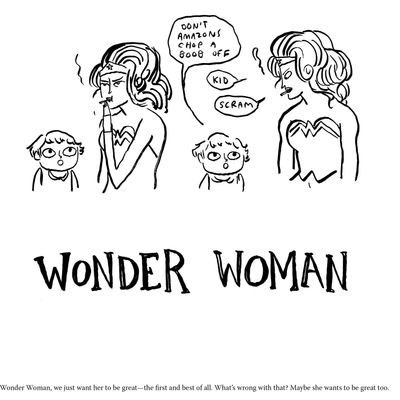
In a just world, Kate Beaton’s work would be required reading in schools. For the better part of a decade, the gifted Canadian cartoonist has crafted pithy strips about literature and history that are simultaneously high-minded and delightfully vulgar. Just a few of the best examples: a series of three-panel tales about Queen Victoria’s lust for her royal consort; the narrator of Emily Brontë’s Wuthering Heights offering a joint before telling the novel’s insane story; and extrapolations of the weird covers of early Nancy Drew books.
Her work has made her a cult icon for brainy nerds — as well as a best-selling author of collected editions of her strips and a children’s book entitled The Princess and the Pony. She’s also very likely the victim of extremely lucrative joke theft: A strip she did about the 1860s War of French Intervention featured Benito Juárez frowning and saying, “I had fun once and it was awful.” Of course, that phrase mysteriously appeared almost verbatim as the slogan for Grumpy Cat shortly afterward. (To her credit, she’s relatively chill about the whole thing.)
Nevertheless, Beaton soldiers on, and this month, she’s releasing a new strip collection called Step Aside, Pops. It shows her moving into new territory, such as riffs on superhero comics (a topic she’d generally avoided in her cartooning career) and biting cultural commentary about depictions of action-hero women. (She’s also speaking at Manhattan’s Housing Works on Wednesday.) We caught up with Beaton to talk about giant robots, Tumblr arguments, and historical topics that are just too damn sad for comics.
You’ve said in the past that you didn’t grow up reading comics, but in some of your recent work, like the “Strong Female Characters” strips, you’ve started delving into the crummy, scantily clad ways that female heroes are depicted in them. What spurred your interest in that?
I think it’s because I am a female creator in comics. That conversation comes your way, whether you like it or not. You can’t help but be aware of that conversation. On your Twitter account, people are asking about it. You go to a panel about women in comics and people are talking about gender representation and those things like that. And it’s interesting stuff, because it’s not like I have a long history with comics. I didn’t read them in the ‘90s. I don’t know what X-Men No. 5 is, or how Rogue has changed, or anything like that. But it’s super-interesting to learn about, and if I’m learning about something, I usually start trying to mine the humor in it. That comes naturally.
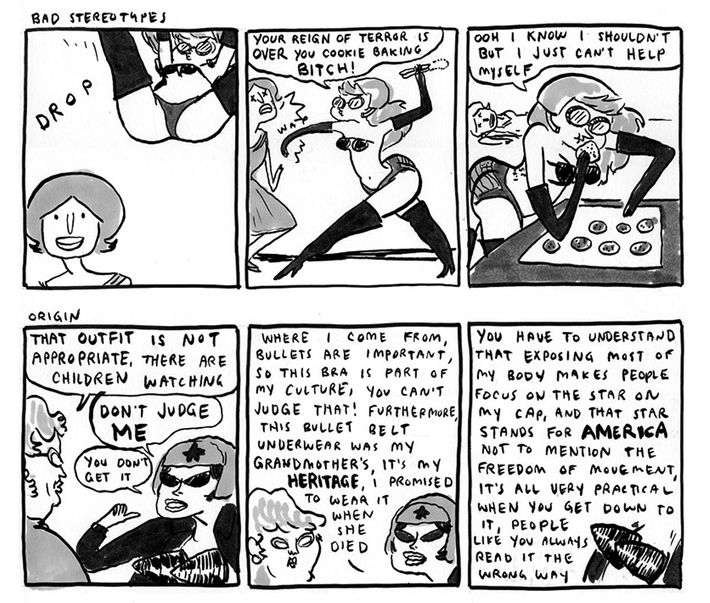
What led to you and your co-creators actually doing the strips?
Oh my God. It was at a party at [cartoonist] Carly [Monardo]’s house. We had a few drinks, I believe. When cartoonists go to parties, it’s awful for everybody else, because they just start drawing. [Laughs.] If your girlfriend or boyfriend is not a cartoonist, they’re just sitting around and going, “I hate this.”
You literally just sit down and start drawing?
Yeah! I think we were talking about a movie that we saw or something like that, and about that type of character that you often get. You know, where the audience says, “We’d like to have women characters!” and the creators are like, “Here’s one for you, ladies! Eat this up!” And it’s an empty character who sucks and has a gun and maybe a peg leg and a huge set of boobs. It’s terrible! We kept designing these characters trying to outdo one another on how bad they were and how they’re supposed to be these badass characters. On the website, you can see the originals. The poses are extremely gratuitous. But cartoony!
Have you gotten flak for the strips from people whom you otherwise agree with?
Not really! You know how sometimes there’s an internet argument and someone will lay down an image and it’s supposed to be a mic drop? They’ll do that with this comic, and it’s just like this, and it kind of ends the conversation. I don’t think it’s very helpful. It’s just one comic, it’s one joke, it’s not a nuanced argument that takes in all of these different issues and sides and problems and solutions. So that’s something that I’ve seen every now and then. You can’t just drop my comic in there and walk out of the room.
So people will drop a strip from “Strong Female Characters” as a way to win an argument?
Yeah, or use it to say, “This is the way that it is.” It’s a lazy form of arguing. When you make a comic that illustrates and critiques an issue, then it can be a shorthand for the argument itself when people are trying to discuss it. I find it derailing when it’s used that way. The comic’s just supposed to be funny! It’s not a thesis! On the other hand, it’s extremely flattering to be that reference and to have made something that struck a chord with people at that time.
You came up with the line “I had fun once and it was awful” in a strip, long before that became a catchphrase for Grumpy Cat — and there are periodic allegations that your joke was stolen. Have you forgiven Grumpy Cat?
I don’t really know what to make of that. That cat would still be famous, whether or not it stole my joke. I could say that it stole my joke, and then people will argue tooth and nail that it did not, and that their uncle said it three years ago and that it’s a common phrase. It stole my joke! But what the hell can I do? I can’t do anything. My comics get turned into memes all of the time. They don’t bother me.
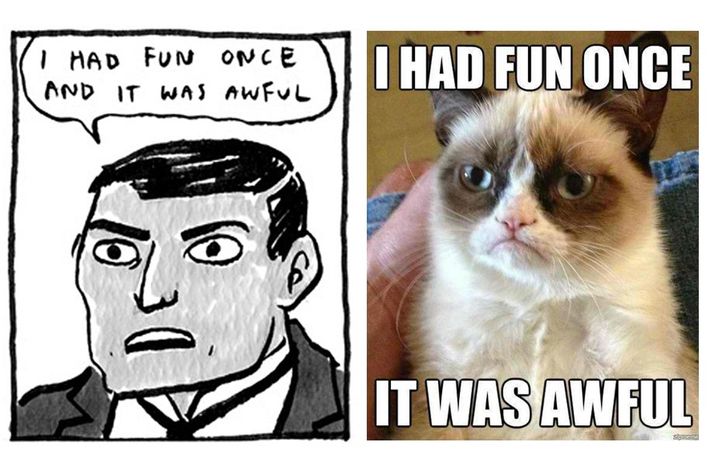
It’s just the fact that Grumpy Cat — well, first of all, the cat has a super-insensitive name, and is a weird moneymaking machine for these people that care so little about the cat that they named it something awful. And it makes lots and lots and money. But it’s gonna do that with or without my joke; it’s just that my joke is featured very prominently on its stuff. The nature of the internet is that if you mention it, people will immediately be like, “She’s furious and she can’t sleep at night!” As though you’re frothing at the mouth and livid. People want you to be angry, I guess. But what can you do? It’s the internet. People take jokes from here and there and put them somewhere else and claim they made it. You have to get used to it, I guess, or else you’ll go nuts.
What books are on your nightstand right now?
You know, I don’t read that many comics, so I’ve been trying to catch up on comics. I have a big pile right now. I have The Wicked + The Divine by Jamie McKelvie and Kieron Gillen. I have the second volume of that. And then Southern Bastards, that Image comic. Really, really good. And Rebels, because that’s right up my alley, right? Another one that was recommended to me but I haven’t read yet is called We Stand on Guard, and it’s a Canadian comic.
It sure is! It’s about Canadians fighting American giant robots.
Right? I guess they try to invade and we’re like, “No.” I guess? I haven’t read it yet. But there’s always been annexation crises in Canada where we’re like, “America’s coming to get us!” but America’s like, “No, we’re not.” I guess you guys are after all our sweet water supplies in this.
In the comic, there’s an awe-inspiringly cheeky joke on the first page. The war begins in 2112, which is a solid Rush joke.
Oh, God.
I know.
You’re very well read in comics. You know more about these than I do.
But you know more about the Brontë sisters than I do, so we even out.
Maybe. I’ve been to their hometown! It’s Brontëmania over there.
What did you do there?
There’s a comic show in Leeds called “Thought Bubble,” and it was a 30-minute train ride from it. I just popped in. Their house is a museum, and there are a lot of bars there that market themselves as their brother Branwell’s favorite bar. But he was an alcoholic and he died from drinking!
What is it about the Brontë literature that makes it so rich for mining in your comics?
I don’t know. I feel a lot of comradeship with the Brontës. They’re three women writers, and I’m one of four girls. They wrote, they created themselves, and created these stories and worlds, and they had to pretend to be men in order to get their books published at first, with androgynous pen names. And they created these works of fiction that are not really romances, but because they’re women they’re taken as romances. Like, Wuthering Heights is not really a romance, but people believe that it is, partially because it’s about a relationship between a man and a woman, but also because it was written by a woman. But then you read it and you’re like, These people are terrible!
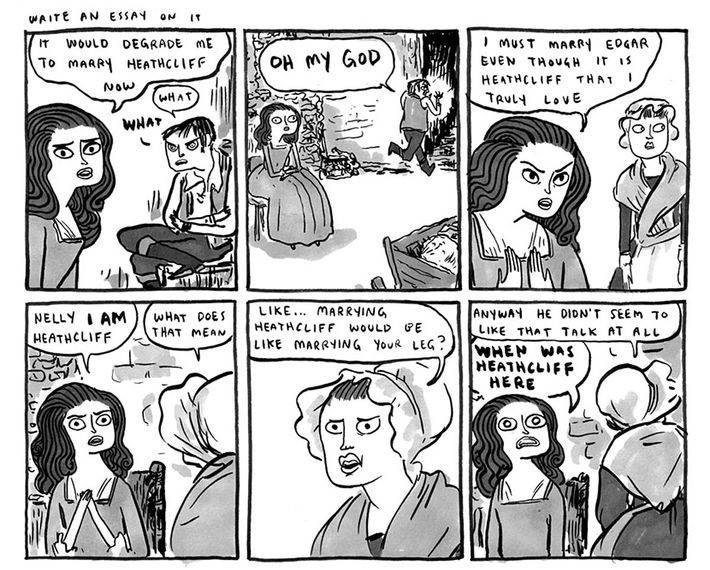
It’s almost like a horror novel at times.
Yeah, like a Gothic horror. Even in Jane Eyre, it’s a not like Mr. Rochester is a dreamboat. I really like the way that people want them to be romances, when they’re not. Listen: Just accept those books for what they are!
What is it about the phrase “aww yissss, some motherfucking bread crumbs” that speaks to you so much? You’ve done it in two different strips.
I have. “Aww yissss” was just making fun of the accent from my hometown. Old men are like, “Yis, yis, oh, yis, how are you today?” We were always imitating that, so I thought of that.
What’s a topic you thought about using in a strip, but it was too grim or depressing to make funny?
Well, I was going to make a strip about Marie-Joseph Angélique of Montreal. She was accused of starting a fire that burned the city down [in 1734], but she was probably a scapegoat because she was a slave. Her story stands out because it’s a Canadian story. In Canada, we like to pretend that you guys were the only ones who had slavery. We’re like, “We had the underground railroad! This is where people came to be free!” But we had slaves. Slavery was part of our history as well. I wanted to do something about her because she stood out, but then her story was so sad. [Laughs.] I was like, I can’t do this. But yeah, we were just as horrible to people who were at a disadvantage as you were. Even though we like to pretend we’re super polite.
Speaking of stuff that’s slightly more serious, when are we going to see a collection of your autobiographical stuff? You have these great stories about your family, but they’ve only been published online. Will there ever be a printed collection of that stuff?
I don’t know, because I have to have their permission. They’re fun things to put online, but the minute that somebody actually has a book that they can take to my dad’s house and point to him and point to the book, it becomes a bit too real. I’m from a really small town, and it’s funny that the internet is more private than a book. Things can get real when you have a book and you’ve singled out these people and are talking about them. It’s not like, in the strips, I reveal that much. I put a few of them on Facebook, and I got comments from our neighbors and stuff, I was like, Noooo, I’m not comfortable with this. But the story about going to Fort McMurray, that might become a book. That’s a fun story to tell.
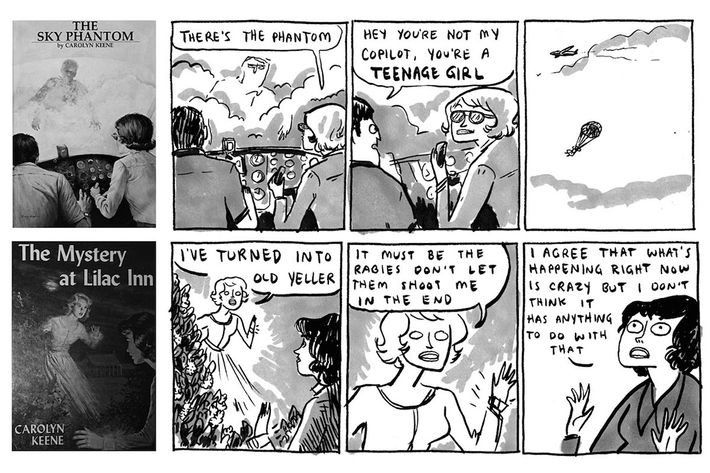
What kind of response have you gotten for The Princess and the Pony so far?
Really, really, good! Great reviews across the board and kids seem to like it. It’s got farts in it. The only bad reviews I’ve seen are from people who don’t like the farts. To each their own.
Do you have kids who’ve said that they’ve started reading the historical and literary stuff? They read Princess and the Pony and then dived into the rest of your work?
Oh, no, no. Princess and the Pony is for little fellows. They’re too innocent. I wouldn’t want them reading my crass, horrible comics.

